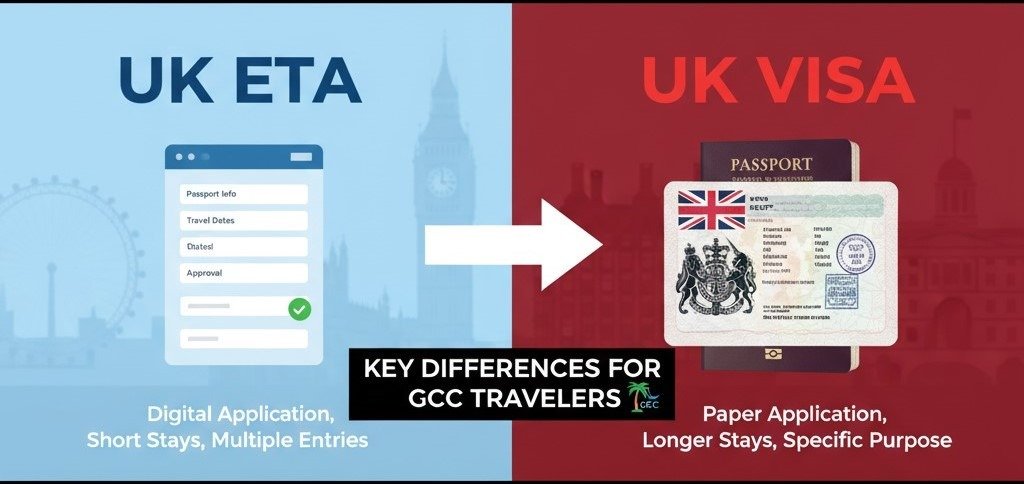If you are a frequent traveler from the UAE, Saudi Arabia, Kuwait, Qatar, Oman, or Bahrain, the way you prepare for a trip to the UK has changed. The days of the Electronic Visa Waiver (EVW) are over. Today, you are looking at two key documents that determine your entry: the new UK Electronic Travel Authorisation (ETA) or the traditional UK Standard Visitor Visa.
Knowing the difference between these two is absolutely essential. Using the wrong one can mean the end of your trip before it even begins.
This comprehensive guide breaks down the core distinctions, helps you decide which one you need, and walks you through the application process for a smooth, stress-free journey to the United Kingdom.
A New Era of UK Travel: The Shift for GCC Citizens
The UK government is moving toward a fully digital border system, and nationals of the Gulf Cooperation Council (GCC) were among the first to experience this change.
From EVW to ETA: A Necessary Upgrade
For years, GCC travelers enjoyed the relative ease of the Electronic Visa Waiver (EVW). While EVW was simple, it was only valid for a single entry and was costlier than the new system. The UK Electronic Travel Authorisation has replaced the EVW for GCC citizens, and this is a major improvement.
The shift isn’t just a simple name change; it’s an upgrade designed for both traveler convenience and national security. The ETA is a digital travel permit that allows the UK to conduct more robust security checks before you even board your flight, streamlining the arrival process once you land. It’s part of a global trend, similar to the ESTA in the US or the upcoming ETIAS in Europe.
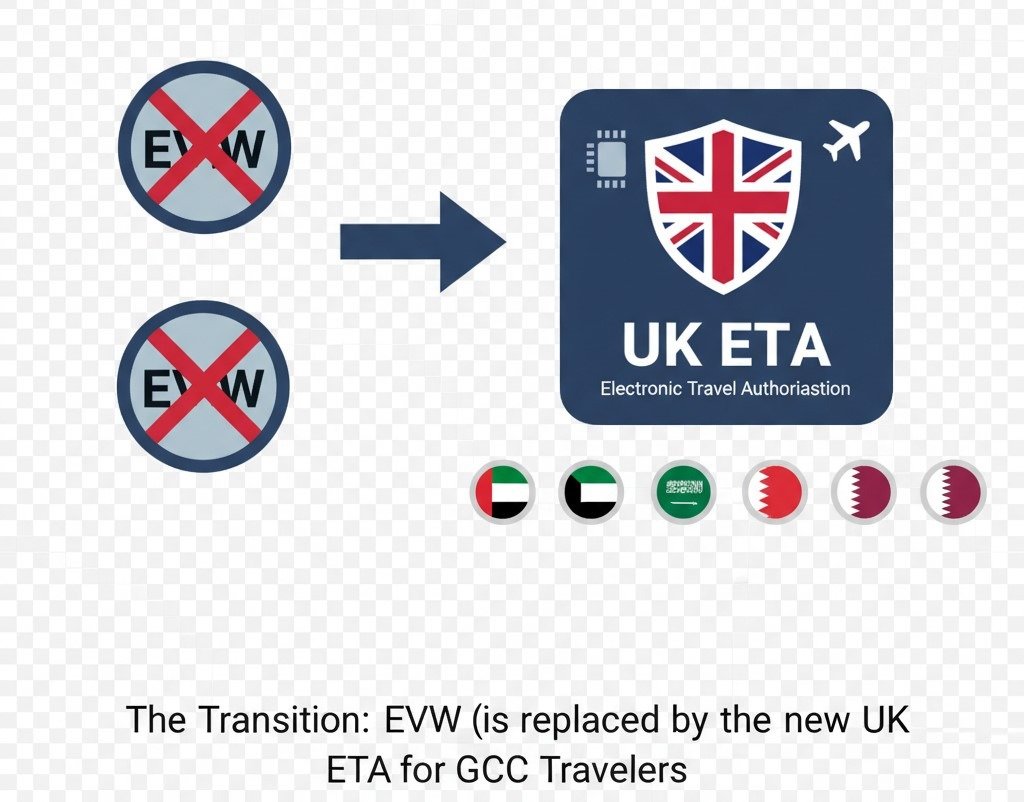
Understanding the UK Electronic Travel Authorisation (ETA)
So, what exactly is the ETA? The key to understanding it is knowing what it is not.
The ETA is a digital travel permission; it is not a visa. It is a pre-screening tool that gives you permission to travel to the UK. Permission to enter is still granted by a Border Force officer upon arrival.
The ETA is tailor-made for the frequent, short-term traveler from the GCC. Here are its core characteristics:
| Feature | UK ETA |
| Validity Period | 2 years (or until your passport expires) |
| Number of Entries | Multiple entries |
| Maximum Stay per Visit | 6 months |
| Application Method | Quick online form or mobile app |
| Current Fee | £26 (per applicant) |
| Purpose | Tourism, visiting family, short business, or short-term study |
This two-year, multiple-entry validity is one of the biggest benefits, offering huge flexibility for those who travel to London, Manchester, or Scotland several times a year. You only need to apply once every two years, which is a significant saving of time compared to applying for an EVW for every trip.
When the Standard Visitor Visa is Still Required
While the ETA is a game-changer for short visits, the UK Standard Visitor Visa (SVV) is still the required document for travelers with longer stays or more complex intentions. The SVV is a formal entry clearance, a much more comprehensive document than the digital ETA.
The Visa’s Purpose: Stability and Length
The SVV is needed when your travel plans go beyond the scope of the ETA.
- Length of Stay: If you need to stay in the UK for longer than six months in one continuous visit, the ETA is not an option. You must apply for a Visa.
- Complex History: If you have a complicated UK immigration updates history (such as having previously overstayed a visit, been refused entry, or have a significant criminal record), the immigration office might advise you to apply for the SVV even if you are eligible for the ETA. A visa application allows for deeper scrutiny and detailed documentation, providing a more robust travel history assessment.
- Specific Intentions: The visa process covers certain activities that are strictly forbidden under the ETA.
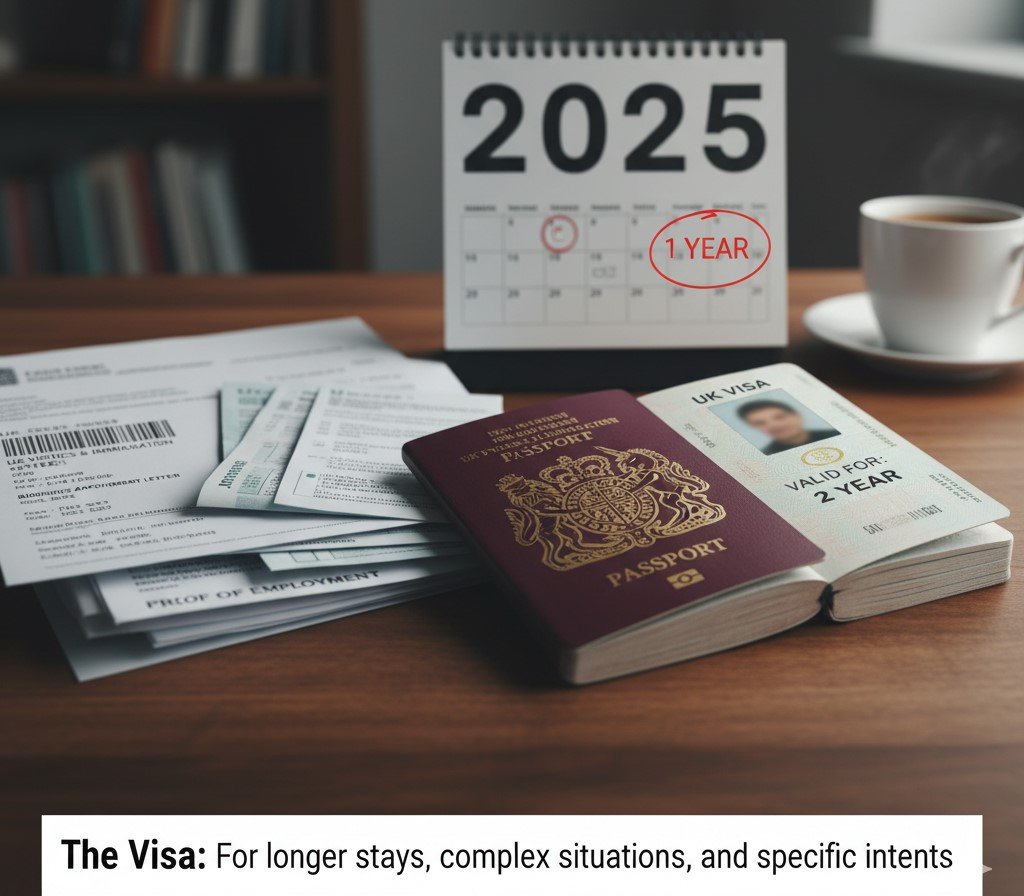
ETA vs. Visa: The 5 Critical Differences at a Glance
This is the most important section for helping travelers make an informed decision. The differences extend far beyond cost and touch on the fundamental requirements of your trip.
| Feature | UK Electronic Travel Authorisation (ETA) | UK Standard Visitor Visa (SVV) |
| 1. Application Process | Fully online (app or website). No in-person appointment or biometrics. | Requires a detailed online application, in-person appointment at a Visa Application Centre (VAC), and biometrics submission. |
| 2. Time & Cost | Fast (usually minutes, max 3 days). Low cost (£26). | Slow (typically 3 weeks or more). High cost (varies: £127 for 6 months, up to over £1,000 for long-term options). |
| 3. Validity & Use | Valid for 2 years. Allows multiple entries, max 6 months per stay. | Valid for the length you apply for (6 months, 2, 5, or 10 years). Max 6 months per stay. |
| 4. Required Documents | Passport details, digital photo, payment card. | Extensive documentation: bank statements, proof of ties to home country (e.g., job, family), accommodation details, travel itinerary. |
| 5. The Guarantee | Digital permission to travel. Does not guarantee entry. | Formal entry clearance. Provides a higher degree of certainty upon arrival. |
Purpose of Travel: Which Permission to Seek
Your reason for traveling to the UK is the most powerful factor in deciding your permit. Here is a simplified breakdown for GCC travelers:
Go with the ETA if your purpose is:
- Tourism or Leisure: Short holidays, visiting famous landmarks, and general sightseeing.
- Visiting Family & Friends: Spending time with relatives or friends who reside in the UK.
- Short Business: Attending meetings, conferences, trade fairs, or negotiating contracts (but not actively working for a UK employer).
- Short Study: Taking a language course or a short, non-academic course lasting less than six months.
- Transit: Passing through the UK on your way to another country, provided you pass through UK border control.
You must apply for the Standard Visitor Visa if your purpose is:
- Long-Term Stay: Any continuous period exceeding six months.
- Marriage or Civil Partnership: Specifically intending to marry or form a civil partnership (a separate Marriage Visitor Visa is required).
- Permitted Paid Engagement (PPE): Performing certain professional activities for pay (though this can sometimes fall under the SVV rules, the complexity dictates a formal visa application).
- Medical Treatment: Seeking private medical treatment for a period over six months.
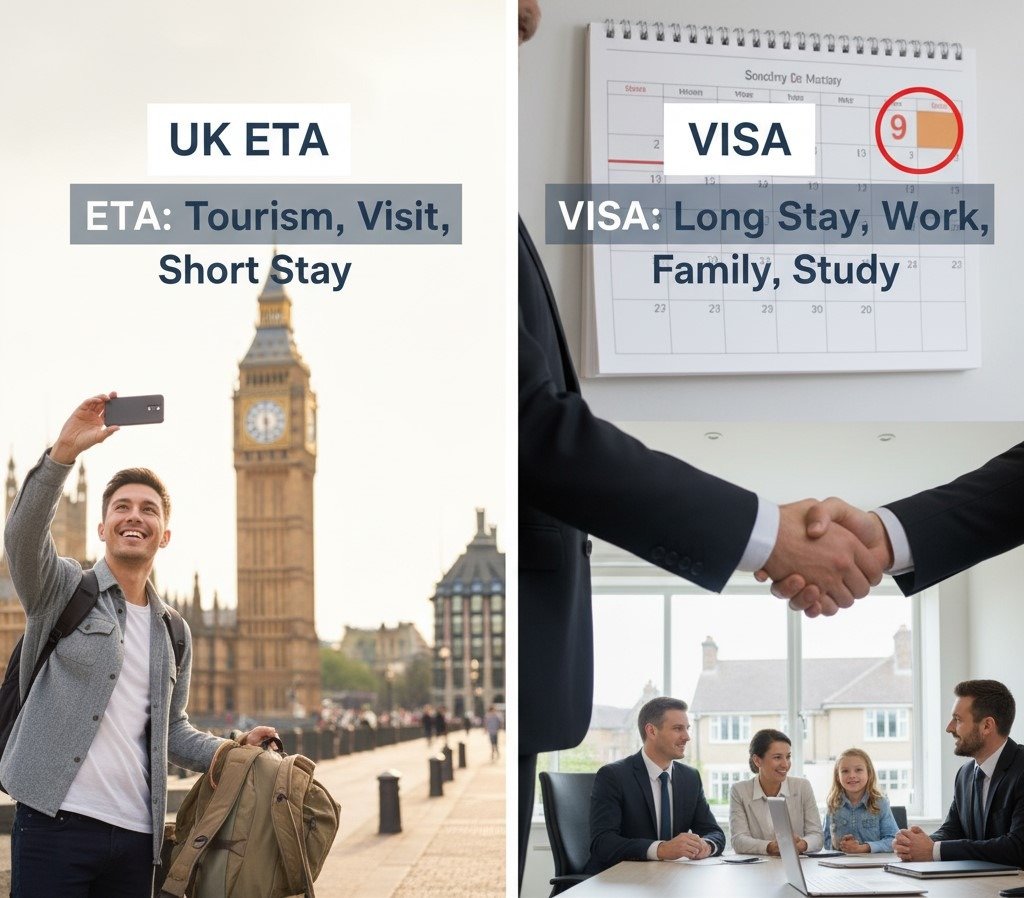
Step-by-Step: The GCC Traveler’s Digital Application Experience
The application for the UK Electronic Travel Authorisation is designed to be quick and intuitive, ensuring a fast and simple application process.
- Preparation is Key: Gather your necessary items: a valid GCC passport, a clear digital photo that meets UK standards (minimum 600 x 750 pixels), a valid credit or debit card for the £26 fee, and an active email address.
- The Digital Submission: The simplest way to apply is through our ‘UK ETA Website‘. You will fill out the online form, providing your personal details and answering a short set of suitability questions regarding your health, criminal history, and previous immigration breaches.
- Payment and Submission: You pay the fee digitally, and your application is submitted.
- Processing Time: Most travelers get approval within minutes. However, the official advice is to allow up to three working days.
- Digital Linkage: Once approved, your UK ETA is electronically linked to your passport. You do not receive a physical stamp or sticker. You’ll receive an email notification of your successful application.
Crucial Advice: The UK advises travelers to apply for their ETA at least 72 hours (three days) before their scheduled departure. Do not wait until the last minute, especially during busy travel seasons.
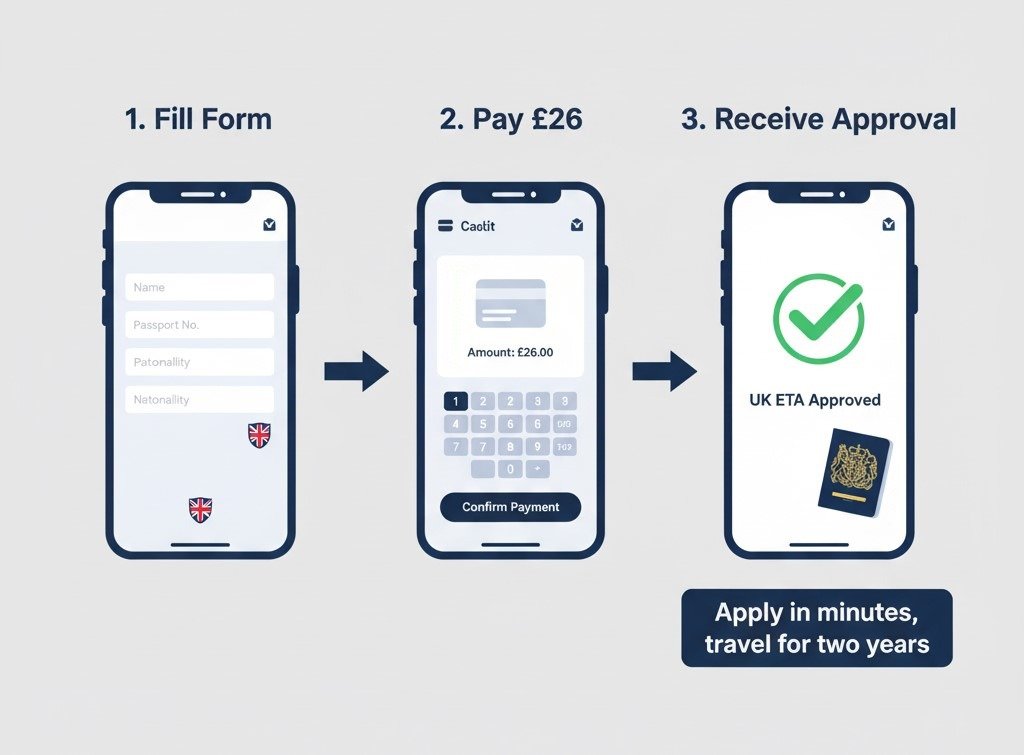
What Happens If Your ETA is Refused?
An ETA refusal is rare, but it can happen, usually if you fail a security check or have a history of immigration violations. It’s important to understand the next step, which moves you squarely into the visa category.
If your Electronic Travel Authorisation is refused, you cannot appeal that decision. You have two clear options:
- Reapply: Check your original application for any simple errors (such as a typo in your passport number) and submit a new application.
- Apply for a Visa: If the refusal is due to a substantive issue (like a past conviction or a previous immigration breach), you will need to apply for a Standard Visitor Visa. This application is more detailed and gives you the chance to provide extensive documentation to argue your case, something the simple ETA application does not allow for.
The key takeaway is that an ETA refusal does not mean you can’t travel; it simply directs you toward the more rigorous UK Visa process.
Final Advice: Choose Wisely for a Smooth Journey
For the vast majority of GCC travelers planning a holiday, a visit to family, or a short business trip to the UK, the new UK ETA is the superior, more efficient, and cost-effective choice. Its multiple-entry, two-year validity offers unmatched flexibility, allowing you to focus on enjoying the experience, not on travel documentation.
However, if your journey involves a stay over six months or falls into a highly specific category (like long-term study or marriage), you must use the appropriate Standard Visitor Visa. Always consult the official UK government guidance to confirm your exact needs before you apply. By understanding the core differences, you ensure your entry to the United Kingdom is seamless, allowing you to enjoy everything England, Scotland, Wales, and Northern Ireland have to offer.
Frequently Asked Questions (FAQ Section)
Q1. Is the UK ETA the same as a visa?
No. The UK ETA is a digital permission to travel required for short stays, while a UK Visa is a formal grant of entry clearance for more complex or long-term purposes. The ETA is quicker to obtain and cheaper.
Q2. How long can GCC citizens stay in the UK with an ETA?
An approved UK ETA allows for a stay of up to six months per visit. The ETA itself is valid for multiple entries over a period of two years (or until your passport expires).
Q3. Do I need a new ETA if I renew my passport?
Yes. The ETA is digitally linked to the passport you used during the application. If you get a new passport, you must apply for a new ETA, even if your previous ETA was still technically valid.
Q4. Can I convert or extend my ETA into a visa once I am in the UK?
No. The ETA is strictly a visitor permit and cannot be converted into any other visa status (like a work or study visa) once you have arrived in the UK. You must leave the UK and apply for the appropriate visa from abroad.
Q5. Is the ETA valid for all four nations of the UK (England, Scotland, Wales, Northern Ireland)?
Yes. The UK ETA grants permission to travel to all four constituent countries of the United Kingdom, as well as the Isle of Man, Jersey, and Guernsey.

